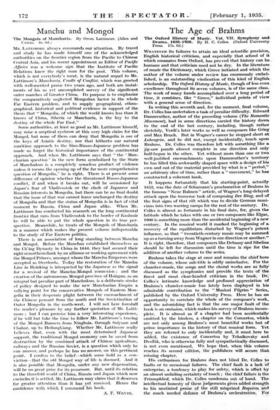Manchu and Mongol
Mn. LArrIMORE always commands our attention. By travel and study he has made himself one of the acknowledged authorities on the frontier region from the Pacific to Chinese Central Asia, and his recent appointment as Editor of Pacific Affairs was a welcome sign that the Institute of Pacific Relations kilew the right man for the post. This volume, which is not everybody's meat, is the natural sequel to Mr. Lattimore's Manchuria, Cradle of Conflict, which was greeted with well-merited praise two years ago, and both are instal- ments of his as yet uncompleted survey -of the significant outer marches of Greater China. - Its purpose is to emphasize the comparatively neglected Mongolian factor in the whole Far Eastern problem, and to supply geographical, ethno- graphical, historical and political evidence in support of the thesis that " Mongolia, of which the World knows less than it knows of China, Siberia or Manchuria, is the key to the destiny of the whole Far East."
Some authorities, at least as good as Mr. Latthnore himself, may raise a sceptical eyebrow at this very high claim for the Mongol, but none of them can deny that Mongolia is one of the keys of Asiatic destiny, nor that hitherto our natural maritime approach to the Sino-Russo-Japanese problem has made us forget the historical importance of the continental approach. And when Mr. Lattimore says that " the ' Man- churian question ' in the new form symbolized by the State of Manchukuo is a completely senseless product of violence unless it means the opening up of the far more comprehensive question of Mongolia," he is right. There is at present some difference of opinion whether the threatened Russo-Japanese conflict, if and when it breaks out, will be occasioned by Japan's fear of Vladivostok or the clash of Japanese and Russian interests in Mongolia, but there can be no final doubt that the issue of that war cannot leave unchanged the destiny of Mongolia and that the status of Mongolia is in fact of vital moment to Russia, China and Japan alike. When Mr. Lattimore has conducted his research on the long continental frontier that runs from Vladivostok to the border of Kashmir he will be able to put the whole question in its true per- spective. Meanwhile, he treats of the Mongols of Manchuria in a manner which makes the .present volume indispensable to the study of Far Eastern politics.
There is an association of long standing between Manchu and Mongol. Before the Manchus established themselves as the Ch'ing Dynasty in China in 1644, they had secured their right ornorthern flank by an alliance or working agreement with the Mongol Princes, amongst whom the Manchu Emperors were accepted as Overlords. Tcday the restoration of the Manchu Line in Hsinking is interpreted by the Japanese as the signal for a revival of the Manchu-Mongol connexion ; and the creation of the autonomous Mongol province of Hsingan, as an integral but peculiar part of Manchukuo, is a deliberate stroke of policy designed to make the new Manchurian Empire a rallying point for the conservative Mongols of Eastern Mon- golia in their desperate plight between the encroachment of the Chinese peasant from the south and the Sovietization of Outer Mongolia in the north-west. I will not here forestall the reader's pleasure by any further quotation of Mr. Latti- more ; but I can promise him a very interesting experience, if he will but take the time to follow Mr. Lattimore's tracing of the Mongol Banners from Ninghsia, through Suiyuan and Chahar, up to Heilungkiang. Whether Mr. Lattimore really believes that, even with the most determined Japanese support, the traditional Mongol economy can be saved from
destruction by the combined attack of Chinese agriculture, railways and the Russian Soviet, is a question which only he can answer, and perhaps he has no answer, on this pertinent point. I confess to the belief—which sonic hold as a con- viction—that the old Mongol way of life is doomed. And it is also possible that Mongolia, under any new dispensation, will be no great prize for its possessor. But, until its relation to the threefold world of China, Russia and Japan Which now encircles it is settled, Mr. Lattimore may claim that it deserves far greater attention than it has yet received. -Hence the confidence with which I commend his book.
A. P. WrIvrE.














































 Previous page
Previous page